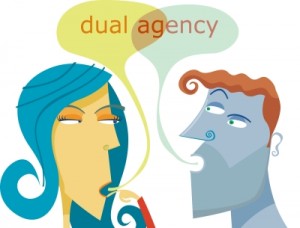
It is a safe observation based on nearly 35 years of real estate practice that the vast majority of consumers, in this case real estate buyers and sellers; do not understand the concepts of “agency”. One might also observe that a significant segment, if not most, of licensed real estate practitioners do not completely understand the concepts of ‘agency”. This is not so much an indictment of real estate licensees as it is a statement on the twisted, awkward, inconsistent and convoluted nature of agency laws that have been imposed on our industry by our esteemed governing and regulatory bodies.
Real estate brokerage is and always has been a commission sales business. Brokers get paid zero unless they make a sale. All brokerage companies train their people to sell, they are called real estate sales people and they are hired by property owners to “sell” their properties. Yet real estate agency laws impose an agency obligation which means that brokers are required to “represent” one party or another. This sales bias coupled with imposed agency duties creates bizarre ethical and legal inconsistencies on a daily basis. There are a handful of states that actually recognize this and allow real estate brokerage to be practiced as transaction brokers or facilitators and not as agents. This more accurately reflects the reality of how real estate brokerage is conducted. Oregon however, does not recognize transaction brokerage and as such requires the agency practice in all cases. In Oregon there are three types of agency relationships:
1. Seller’s Agency
2. Buyer’s Agency
3. Disclosed Limited Agency.
The Seller Agency is by far the most common and makes the most sense. It is clearly established in a written listing or employment agreement between a brokerage company and a party wishing to sell property. It makes sense, it works well and is easily understood and practiced by most real estate brokers.
The Buyer Agency becomes much murkier. It could also be clearly established in a written Buyer Agency agreement, similar to a listing agreement, between a brokerage company and a real estate buyer. However, that is rare. There are a myriad of reasons that most buyers do not sign Buyer agency agreements. In spite of this, Oregon real estate law imposes an agency relationship in most cases between a broker and a buyer. In the absence of a signed agreement, the exact terms of this agency relationship are unclear, exactly when it starts and when it ends is unclear among other things. And stranger yet, in nearly all cases, the seller pays the buyer’s agent’s fee.
The Disclosed Limited Agency is by far the most twisted legal concept that is both imposed and allowed under Oregon real estate law. This is commonly referred to as dual agency or dual representation, and in practical terms, when a broker does “both sides” in a transaction. It allows the broker to represent both the buyer and the seller. And it is perfectly legal under Oregon law. However, most legal purists would shake their heads in disbelief thinking that it is an impossible concept for anyone to have an agency or fiduciary relationship with both parties to a transaction.
In spite of the twisted legalese, the Oregon Real Estate Agency has come up with some practical guidelines that more or less work. The Oregon Real Estate Agency Disclosure Pamphlet is a document that explains that. All brokers are required to provide this document to all potential real estate customers or clients. The document is well done in that it clearly explains “agency” in laymen’s terms and not legalese. Everyone considering buying and selling real estate in Oregon should read it. It is clear and easily understandable. Here is a link to it.
So, what should you as a consumer of real estate brokerage services care about after reading the Oregon Real Estate Agency Disclosure Pamphlet? The question that comes up most often and quite frankly the impetus for this article is, “Should I, as a real estate buyer or seller, consent to Disclosed Limited Agency, commonly known as dual agency, or should I always insist on a single agency?” Here is the answer to that question.
Agency aside, all brokers are held to certain standards, which is as it should be. These standards are universal without regard to the agency.
1. Honest and fair dealing with all parties to a transaction
2. Present all offers, notifications, and other communications to and from parties in a timely manner.
3. Be accountable for all money and property received from or on behalf of any party in a transaction.
4. Disclose all known material facts about a property to all parties.
Use a broker that you know, trust respect, and has the requisite level of experience and expertise. Make a proactive choice of a real estate broker. Someone you know, someone that is referred to you, or someone that you select through a selection and interview process. Many people stumble upon a brokerage relationship by accident. Don’t do that. Make a conscious and proactive selection. In most cases, it is not the best practice to call a listing broker, because their name is on the sign and then use them as your broker under a dual agency situation. Remember, that broker has an established, sometimes a long established relationship with that seller and they probably have no relationship with you. No matter how honest or ethical that broker is, you will be at a disadvantage. Select your own broker.
That being said, once you have selected a broker that you know, trust and respect, then you should be comfortable doing a dual agency transaction with that broker should the situation arise.
Ron Ross, CCIM is a broker with Compass Commercial Real Estate Services in Bend, Oregon.